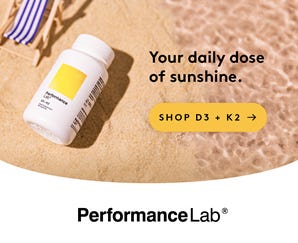Is Your Vitamin D Dangerously Low? What You Need to Know Now
Vitamin D Deficiency: The Hidden Epidemic Affecting 95% of People
Up to 95% of Americans are vitamin D deficient, with levels even higher in many European countries.
Although this deficit is linked to most chronic diseases, this does not necessarily mean it is the cause.
The only thing we know to date is this:
Low vitamin D levels are associated with disease
The Sunshine Vitamin
Vitamin D, often referred to as “the sunshine vitamin,” is not technically a vitamin, as the body can synthesize it when exposed to UVB rays from sunlight.
To maintain optimal levels, it’s recommended to spend time in the sun without sunscreen several times a week: about 10 minutes in summer and 20 minutes in winter, preferably early in the morning or late in the afternoon, adjusting the duration based on factors such as skin type, latitude, and season.
Break free from misinformation with science-backed insights, practical health tips, the latest research, and expert myth-busting—all from a certified Medical Doctor. Join 3,000+ like-minded people now!
Health Benefits You’re Missing
This “vitamin” plays a fundamental role in the body. While it is known for keeping our bones strong, its functions go far beyond that.
It is essential for the proper functioning of the immune system against diseases such as rheumatoid arthritis, lupus, multiple sclerosis, type 1 diabetes, and certain types of cancer.
Additionally, it reduces chronic inflammation, which is associated with most current diseases.
Blood Testing
Thankfully, detecting a vitamin D deficiency is simple.
Common causes of this deficiency include limited sun exposure, obesity, age (the older you are, the lower the synthesis), dark skin, alcohol consumption, and certain medications.
But with a straightforward blood test, you can find out your levels, with normal levels considered above 30 ng/ml.
Vitamin D Supplementation
In 2024, the Endocrine Society issued a new clinical practice guideline aimed at addressing vitamin D requirements to prevent diseases in the healthy population.
It suggests empirical (without prior testing) vitamin D supplementation only for:
People aged 1 to 18 years: the recommended dose is approximately 1,200 IU daily.
Adults under 50 years: the recommended dose is 600 IU daily.
Adults over 75 years: to reduce the risk of mortality. The recommended dose is approximately 900 IU daily.
Pregnant women: to reduce the risk of complications. The recommended dose is approximately 2,500 IU daily.
People with prediabetes: to reduce the risk of developing type 2 diabetes. The recommended dose is approximately 3,500 IU daily.
This guideline was widely criticized for not supporting routine screening for 25(OH)D in the general population and not including other population groups that could also benefit from vitamin D supplementation.
In contrast, a review published in the journal Nature in 2021 recommends:
Correcting vitamin D deficiency in all individuals who have it (which requires testing)
A daily dose of 2,000 to 4,000 IU as safe for the adult population
Combining Vitamin D With Vitamin K2
Given the variety of opinions and recommendations, you should consult your doctor.
If vitamin D supplementation is indicated in your case, it would be ideal to combine it with vitamin K2.
Together, they:
Increase bone mineral density by directing calcium to your bones 💪
Reduce the risk of coronary artery disease by preventing calcium buildup in arteries ❤️
Performance Lab® D3 + K2: the One I Use and Recommend
Here’s why:
Based on Nobel Prize-winning research: NutriGenesis® technology mimics nature for better absorption. Nutrients are grown, not synthesized or isolated
Superior vitamin D3 form: 87% more potent than D2, ensuring maximum effectiveness
Liposomal D3 for for optimal absorption and efficacy: Raises vitamin D levels in hours for fast action
Vitamin K2: Works in perfect synergy with D3 to deliver stronger bones and better calcium utilization
Research-backed daily dosages: Provides 25 µg (1000 IU) D3 and 50 µg (2000 IU) K2 for consistent, year-round health benefits
Plant-based and vegan-friendly: Derived from algae, certified vegan, and suitable for all ages
Easy to swallow
NutriCaps® prebiotic capsules: Easy-to-swallow capsules made from prebiotic fiber, supporting gut health
Third-party tested and validated
Clean label: Free from carrageenan, cellulose/HPMC, GMOs, synthetic additives, caffeine, soy, gluten, allergens, and irradiation
B Corporation Certified: This company meets high standards of social and environmental impact
🎁 Get FREE months of premium access when your friends subscribe—just by sharing this newsletter!
To your health,
Sara Redondo, MD
P.S. You can read the studies by clicking on the links.
Copyright © 2024. All rights reserved.
Disclaimer:
The information in this newsletter is for educational and informational purposes only. It is not intended as medical advice, nor should it be used as a substitute for professional healthcare guidance, diagnosis, or treatment.
Always seek the advice of your doctor or a qualified healthcare provider before making any changes to your health routine, starting new treatments, or addressing specific medical concerns.
This content does not create a doctor-patient relationship. While I make every effort to ensure accuracy, the information provided may not apply to your unique situation.
P.S. This post contains an affiliate link. If you purchase through it, I may earn a small commission at no extra cost to you. Thank you for your support ❤️






Thanks for the tip about Vitamin K. No one has ever mentioned it to me. I'm a 78 year old sun goddess, but I have to take Prolia shots for low bone density. I also take Vitamin D with Calcium. I'll ask my doctor about K. Very interesting article.
Vitamins D is so important to so many body functions. Of course the best way to get it is to have our body synthesized it from the sun. So getting outside without sunscreen for short period at a time is essential. Also a thing to remember is Vitamin D is made from cholesterol and when we lower our cholesterol levels, it will have a negative effect on our vitamin D levels. No cholesterol, no sun, no vitamin D.